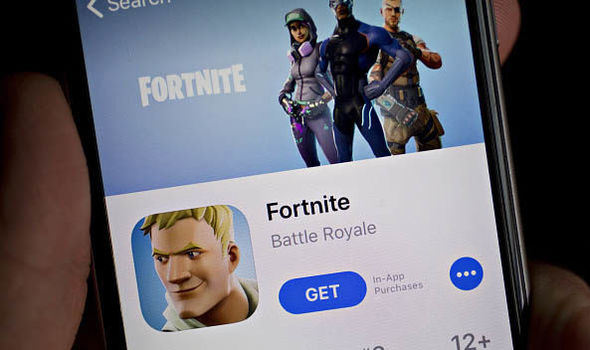Fortnite IOS: Exploring The Reasons For Its Removal From The App Store

Table of Contents
The Epic Games vs. Apple Dispute
The central conflict between Epic Games and Apple boils down to a disagreement over Apple's App Store policies and the 30% commission it levies on in-app purchases. Epic Games, frustrated by this commission, directly challenged Apple's control by introducing a direct payment system within Fortnite, offering users lower prices than those available through Apple's system. This move directly violated Apple's App Store guidelines, resulting in the swift removal of Fortnite from the App Store.
- Epic Games' direct payment system: This was the catalyst for the conflict, offering users a way to purchase in-game currency, V-Bucks, bypassing Apple's in-app purchase system and its 30% cut.
- Lower prices for users: This tactic aimed to attract players by offering better value, directly undercutting Apple's revenue model.
- Apple's retaliatory action: The immediate removal of Fortnite from the App Store was a strong response to what Apple perceived as a violation of its terms of service.
- Violation of App Store Guidelines: Epic Games knowingly violated Apple's rules regarding in-app purchasing, triggering Apple's response.
This action had significant financial implications for both companies. Apple lost a significant revenue stream from Fortnite's in-app purchases, while Epic Games faced the loss of a substantial portion of its player base. The legal battle that ensued involved accusations of anti-competitive practices and control over a digital marketplace.
Apple's App Store Policies and Their Impact on Developers
At the heart of the Fortnite iOS removal lies Apple's App Store policies, particularly its 30% commission on all digital goods sold through its platform. This commission has been a source of contention for numerous developers, who argue it is an anti-competitive practice that stifles innovation and reduces their profitability.
- Anti-competitive claims: Many developers argue that Apple's 30% commission is excessively high and gives Apple an unfair advantage in the market.
- Impact on smaller developers: The high commission can significantly impact the profitability of smaller developers, making it difficult for them to compete and thrive.
- Apple's justification: Apple defends its policies by claiming they cover the costs of maintaining the App Store's infrastructure, security, and marketing.
- Control over the ecosystem: The debate centers on Apple's control over its walled garden and whether it stifles competition and limits consumer choice.
Numerous other developers have voiced similar concerns regarding Apple's App Store policies, highlighting a broader issue within the mobile app ecosystem. The Fortnite iOS situation has brought this long-standing debate into sharper focus.
The Impact on Fortnite Players and the iOS Gaming Ecosystem
The removal of Fortnite iOS had a significant negative impact on its millions of iOS players. They lost access to their favorite game, its vibrant community, and their in-game progress.
- Loss of access to Fortnite: iOS users were suddenly cut off from playing Fortnite, a significant blow to the game's loyal following.
- Migration to other platforms: Players were forced to switch to alternative platforms like Android, PC, or consoles, causing disruption and inconvenience.
- Implications for the mobile gaming landscape: The situation highlighted the power dynamics between app developers and platform holders, raising concerns about consumer choice and market competition.
- Debate around platform control: The incident fueled the ongoing debate about the extent to which platform holders should control their ecosystems and the implications for developers and consumers.
The long-term effects on the iOS gaming market remain to be seen. Similar situations could arise in the future, highlighting the need for a more balanced approach to App Store policies and developer relations. The reaction from Fortnite players was swift and passionate, with many expressing their frustration and disappointment at the loss of access to the game.
Alternative Solutions and Future of Fortnite on iOS
While the immediate future of Fortnite on iOS remains uncertain, several potential solutions exist.
- Fortnite's return to the App Store: A resolution to the legal battle could potentially lead to Fortnite's reinstatement on the App Store, although this outcome isn't guaranteed.
- The ongoing legal battle: The legal repercussions of the dispute will significantly influence the outcome and potentially set precedents for future conflicts between app developers and platform holders.
- Cloud gaming as a solution: Cloud gaming services could provide a viable alternative, allowing iOS users to access Fortnite without needing a native app.
- Epic Games' strategy: Epic Games needs to adapt its strategy to ensure that iOS users still have access to the game, possibly through alternative distribution channels.
The long-term implications depend heavily on the outcome of the legal proceedings and the willingness of both parties to find a compromise. The possibility of a resolution that balances the interests of developers, platform holders, and consumers remains a key point of discussion.
Conclusion
The removal of Fortnite iOS from the App Store stemmed primarily from a clash between Epic Games and Apple over Apple's in-app purchase policies and the resulting 30% commission. This dispute highlighted broader concerns about anti-competitive practices, the impact on developers, and the control exerted by platform holders over their ecosystems. The Fortnite iOS situation created significant disruption for millions of players, impacting the mobile gaming landscape and prompting an ongoing legal battle with potentially far-reaching implications for the entire app development industry. Share your thoughts on the Fortnite iOS situation, the future of Fortnite on iOS, and the impact of App Store policies on the gaming industry. Let's continue the discussion about Fortnite's absence from iOS and what the future holds for this popular battle royale game.

Featured Posts
-
 Renovation Stress How A House Therapist Can Save Your Project
May 18, 2025
Renovation Stress How A House Therapist Can Save Your Project
May 18, 2025 -
 Blue Origin Cancels Launch Subsystem Issue Delays Mission
May 18, 2025
Blue Origin Cancels Launch Subsystem Issue Delays Mission
May 18, 2025 -
 Teylor Svift Pobila Rekord Prodazh Vinila 10 Let Uspekha
May 18, 2025
Teylor Svift Pobila Rekord Prodazh Vinila 10 Let Uspekha
May 18, 2025 -
 Roucou Hong Kongs Innovative Cheese Focused Omakase Restaurant
May 18, 2025
Roucou Hong Kongs Innovative Cheese Focused Omakase Restaurant
May 18, 2025 -
 5 26 52
May 18, 2025
5 26 52
May 18, 2025
Latest Posts
-
 Dominate Your Mlb Dfs Contests May 8th Hitter Projections And Avoids
May 18, 2025
Dominate Your Mlb Dfs Contests May 8th Hitter Projections And Avoids
May 18, 2025 -
 Amanda Bynes Returns To The Public Eye With 50 Only Fans Subscription
May 18, 2025
Amanda Bynes Returns To The Public Eye With 50 Only Fans Subscription
May 18, 2025 -
 Former Child Star Amanda Bynes Joins Only Fans For 50 A Month
May 18, 2025
Former Child Star Amanda Bynes Joins Only Fans For 50 A Month
May 18, 2025 -
 Allegations Of Past Rituals Surface Regarding Amanda Bynes School Days
May 18, 2025
Allegations Of Past Rituals Surface Regarding Amanda Bynes School Days
May 18, 2025 -
 Classmate Recalls Disturbing Incidents Involving Amanda Bynes At School
May 18, 2025
Classmate Recalls Disturbing Incidents Involving Amanda Bynes At School
May 18, 2025
